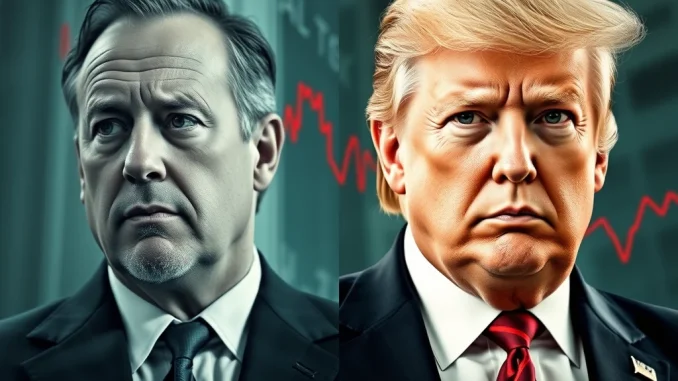
Is there a hidden motive behind the push for tariffs? Crypto界 (crypto world) is buzzing after Arthur Hayes, the influential co-founder of BitMEX, dropped a bombshell on X (formerly Twitter). He suggests that Donald Trump’s tariff policies are fueled by something unexpected: ‘schadenfreude’. Could this sentiment among Trump’s supporters actually be a driving force in global economics and, more specifically, impacting the crypto market? Let’s dive deep into Hayes’s intriguing theory and its potential ramifications.
Arthur Hayes Unveils ‘Schadenfreude’ in Tariff Support
Hayes argues that a segment of Donald Trump’s base, potentially those without substantial financial assets, might derive satisfaction from the potential financial discomfort of wealthier investors. This ‘schadenfreude’, or pleasure derived from misfortune, could embolden Trump to implement aggressive tariffs, regardless of warnings about broader economic consequences. This is a provocative idea, challenging conventional economic analysis. Let’s break down why this perspective is gaining traction:
- Emotional Drivers in Policy: Hayes points to a less rational, more emotional basis for policy support. It’s not just about economics; it’s about sentiment and societal divisions.
- Wealth Disparity & Resentment: The theory taps into existing anxieties about wealth inequality. Tariffs, in this context, become a tool to potentially ‘punish’ or at least inconvenience wealthier individuals and institutions.
- Challenging Traditional Economic Models: This viewpoint suggests that traditional economic models, focused solely on financial gains and losses, might be missing a crucial element: the psychological and social dimensions of economic policy.
This perspective is not just about tariffs; it touches upon broader societal trends and the growing influence of non-economic factors in political and economic decision-making.
Trump Tariffs: A Risky Gamble or Calculated Move?
Donald Trump’s stance on tariffs is no secret. He has consistently advocated for them as a tool to protect domestic industries and exert economic leverage. However, the potential downsides are significant, as highlighted by Pershing Square CEO Bill Ackman. Ackman warned that these Trump tariffs could negatively impact millions. But is Trump’s approach simply reckless, or is there a calculated strategy at play, perhaps fueled by the ‘schadenfreude’ Hayes describes?
| Argument for Tariffs | Argument Against Tariffs |
|---|---|
|
|
The debate around Trump tariffs is complex, with valid arguments on both sides. Hayes’s ‘schadenfreude’ theory adds another layer of complexity, suggesting that emotional and social factors might be as important as pure economic calculations in understanding the motivation behind these policies.
Crypto Exchange BitMEX Founder’s Perspective: Why It Matters
Why should the crypto community pay attention to Arthur Hayes’s analysis? As the co-founder of crypto exchange BitMEX, Hayes has a deep understanding of financial markets and investor psychology. His insights often carry weight within the crypto space and beyond. Here’s why his take on tariffs and ‘schadenfreude’ is relevant to crypto enthusiasts:
- Market Volatility: Tariffs and trade tensions can inject volatility into all markets, including crypto. Understanding the underlying drivers, even emotional ones, can help navigate market fluctuations.
- Broader Economic Trends: Crypto doesn’t exist in a vacuum. It’s intertwined with the global economy. Major shifts in economic policy, like tariff implementations, inevitably impact the crypto ecosystem.
- Investor Sentiment: Hayes’s theory highlights the importance of investor sentiment. If ‘schadenfreude’ is indeed a factor, it suggests a potentially unpredictable and emotionally charged market environment.
- Decentralization vs. Centralized Power: The discussion around tariffs and centralized government decisions contrasts with the decentralized ethos of crypto. It prompts reflection on the interplay between these two worlds.
Hayes’s commentary serves as a reminder that the crypto market is influenced by a wide range of factors, extending beyond just technological advancements and adoption rates.
Is ‘Schadenfreude’ a Powerful Force in Global Economics?
The concept of ‘schadenfreude’ influencing economic policy might sound far-fetched to some. However, behavioral economics has long recognized the role of emotions in financial decision-making. Could ‘schadenfreude’ be a significant, yet often overlooked, force in shaping global economic events?
| Concept | Description | Potential Impact on Tariffs |
|---|---|---|
| Schadenfreude | Pleasure derived from someone else’s misfortune. | Could increase public support for tariffs if perceived to harm wealthier investors, regardless of broader economic consequences. |
| Behavioral Economics | Study of psychological factors influencing economic decisions. | Highlights the limitations of purely rational economic models and the importance of emotions like ‘schadenfreude’. |
| Political Polarization | Division of society into opposing political groups. | ‘Schadenfreude’ could be amplified in polarized environments, where harming the ‘other side’ becomes a goal in itself. |
It’s crucial to consider that while ‘schadenfreude’ might be a contributing factor, it’s unlikely to be the sole driver of tariff policies. Economic, political, and strategic considerations are also at play. However, acknowledging the potential influence of such emotions offers a more nuanced and perhaps more realistic understanding of current global economic trends.
Bill Ackman’s Warning and a Potential ‘Ceasefire’
While Arthur Hayes highlights the ‘schadenfreude’ angle, Pershing Square CEO Bill Ackman’s warning provides a stark reminder of the real-world consequences of tariffs. Ackman emphasized that Trump tariffs could harm millions, urging for a ‘ceasefire’ before it’s too late. This call for de-escalation underscores the urgency of the situation and the potential for significant economic damage.
Ackman’s perspective brings a dose of pragmatism to the discussion. While Hayes’s analysis delves into the psychological undercurrents, Ackman focuses on the tangible risks. Both viewpoints are valuable in understanding the multifaceted nature of the tariff debate. Is a ‘ceasefire’ possible? Only time will tell, but the warnings are clear: the stakes are high.
Final Thoughts: Decoding the Crypto Narrative Beyond the Numbers
Arthur Hayes’s ‘schadenfreude’ theory offers a fascinating and somewhat unsettling lens through which to view the ongoing tariff discussions. It prompts us to look beyond traditional economic analyses and consider the emotional and social forces shaping global policy. For the crypto community, this perspective is particularly relevant. Understanding these deeper currents can provide a more comprehensive view of market dynamics and the broader forces influencing the digital asset landscape.
While the future of tariffs and their ultimate impact remain uncertain, Hayes’s analysis serves as a powerful reminder: economics, and especially the world of crypto, is not just about numbers and charts. It’s also about people, emotions, and the complex interplay of human motivations. Staying informed and considering these less tangible factors can be crucial for navigating the ever-evolving crypto market and the global economic stage.



